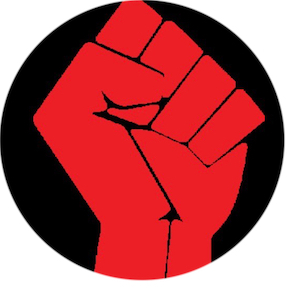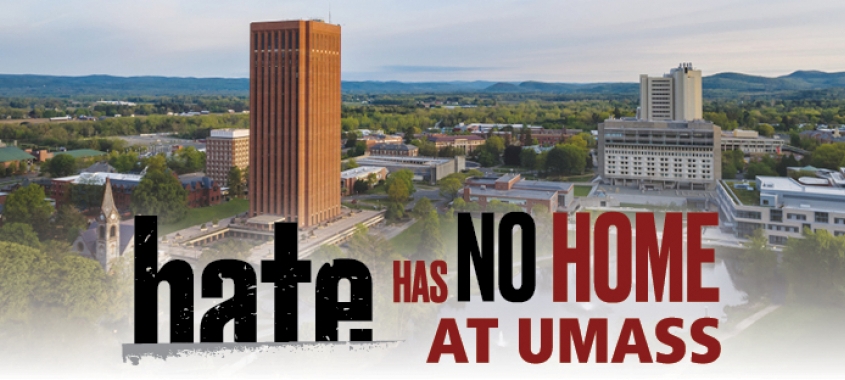By Tristan Smith
The shouts of derogatory names could be heard from the rooftops. Nazi Swastikas have been drawn on the whiteboards. Racist and homophobic slurs have been engraved onto the communal bathroom walls. Signs that proclaimed: “Black Lives Matter,” were stripped down and torn to pieces.
At the University of Massachusetts Amherst, many can attest that hate has been a trend on campus for years.
According to the UMass Amherst bias-incident report page, there have been approximately 42 reported hate-incited incidents on campus over the past two years. Recently, two have occurred since the start of the new academic year.
UMass Amherst has responded to a handful of these acts of hate, with memos and letters written by Chancellor Kumble R. Subbaswamy, in hopes to solidify the slogan “Hate has no Home at UMass.”
As a call to action, UMass has increased security and surveillance in residence halls, implemented new diversity training for staff, and has offered new courses discussing the racial injustice that has swamped America for years.
A Diversity, Equity, and Inclusion department was developed in response to these bias-incidents. Their mission is to, “Foster a culture of excellence through diverse people, ideas, and perspectives.” The department plans to accomplish this new goal by promoting all-inclusive events and workshops, such as their Learning Community Book Group series, Dignity, and Respect in Action (DARIA) Conversation series, and Campus Climate Improvement Grant initiative. Additionally, the department provides students with a crisis support hotline, which allows students to report any hate-induced crime or incident.
“After assessing threats and engaging relevant leadership, our protocols for response prioritize engaging with those most directly impacted, and assessing and working to meet any immediate and long-term needs, in addition to bringing to bear resources for counseling and support for those most directly impacted,” said Emmanuel Adero, department leader of Diversity, Equity and Inclusion
Although the department’s response may not leave members of the campus community “Feeling 100% satisfied,” said Adero. “This method of approach is generally as effective as the circumstances allow.”
However, some students believe that UMass’ attempts to extinguish hate on campus isn’t enough.
“If you just send an email, it’s just going to keep happening,” said Students of Caribbean Ancestry member Tyler Pina. Pina has claimed that most students only check their emails for academic reasons and dubbed the university’s efforts as “un-comforting and ineffective.”
African Student Association member, Deborah Boateng, offered a similar sentiment:
“I don’t think it’s the resources the school provides. It’s about what you’re doing to make sure the situation doesn’t persist.”
Boateng states that bias-incidents are still a common occurrence on campus and UMass’ response has remained stagnant and lackadaisical.
At UMass, an average of 16 bias incident reports occurs each semester, according to the bias incident report page. This average has not faltered since the inception of the Diversity, Equity, and Inclusion department.
Boateng recounts a time where someone vandalized the “M.A.G.A.” slogan onto the floor of her classroom. The writing made her uncomfortable, so she brought the vandalization to Chancellor Subbaswamy’s attention.
“I didn’t want to go to the Diversity and Inclusion department. I want [Subbaswamy] to see me, I want him to know what the problem is,” she said.
Instead of assuring the incident was properly handled, Subbaswamy ushered Boateng to a Diversity and Inclusion staff member. The staff sluggishly responded to the incident, power-washing the vandalism off the floor only after Boateng consistently complained about the issue.
“I had to threaten to leave the school to get the university to take action,” said Boateng.
The investigation of these bias-incidents were handled by the UMass Police Department (UMPD). UMPD defines bias-incidents as malicious acts intended to “degrade, intimidate, and or threaten specific demographics on campus.”
“Bias incidents are often misconstrued with hate-crimes,” said UMPD Deputy Chief Patrick Archbald. Hate crimes are individually-targeted instances, while bias incidents are directed at an entire demographic. Archbald said that hate-crimes are rare on campus, with only a handful occurring over the past few years. However, one has occurred on campus this year and it is currently being investigated.
“Bias incidents are still very serious, but often don’t lead to us charging someone,” said Archbald.
Archbald cited these cases as “extremely hard” and almost impossible to solve due to a lack of evidence recovered from the scene. Most incidents occur late at night when there aren’t any passersby, making witnesses scarce.
UMPD employs numerous community outreach officers to respond to these incidents and enforce inclusivity on campus.
“Their goal is to close the gap between us and the community. We try to be inclusive in all we do,” he stated.
These officers attend cultural events hosted around campus and socialize with the audiences at these events while attempting to assist event holders as much as possible. Archbald informed that these officers host their own “Outreach Seminars,” in which they interact with students of different nationalities and ethnic backgrounds.
“We do a lot of ‘Know Your Rights’ seminars where we inform all students of the different bylaws in Amherst,” said Archbald.
Archbald said the goal of all UMPD officers to support students and to make them feel as comfortable as possible on campus.
“We try to be inclusive in all things we do,” he said.
These efforts to promote inclusivity on campus have not mitigated the current trend of bias-incidents reported on campus. Pina believed if the university brought more awareness to these incidents, their numbers are sure to diminish.
“It’s kind of like slavery or race issues-it’s uncomfortable for people to talk about,” said Pina.
Pina suggested the Chancellor address these issues in-person, as well as encouraged teachers to discuss them in class. Pina and other members of his organization also wished for Chancellor Subbaswamy to conduct a press conference, in which he’ll invite the whole university to attend, and bring awareness to the vast amount of bias-incidents occurring on campus.
“If we don’t discuss it, it’s going to continue,” Pina said as an attempt to fill the room with hope for UMass Amherst.

